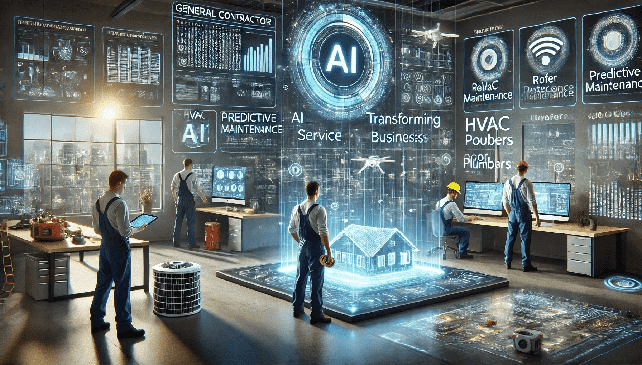Artificial Intelligence (AI) is transforming how service-based businesses operate, enabling them to deliver smarter, faster, and more personalized experiences. By automating routine processes, analyzing vast amounts of data, and providing actionable insights, AI equips businesses to adapt to specific market needs, offering a competitive edge in an increasingly digital world.
In this article, we’ll explore advantages of AI, real-world use cases, and how businesses can tailor AI solutions to meet their unique challenges.
Advantages of AI in Service-Based Businesses
1. Increased Efficiency
AI takes over time-consuming, repetitive tasks, freeing up employees to focus on more strategic initiatives. For example, appointment scheduling systems powered by AI can handle complex bookings without human intervention, minimizing errors and saving time.
2. Cost Reduction
By streamlining operations, AI significantly reduces operating costs. Automated customer service agents, such as chatbots, can answer frequently asked questions 24/7, reducing the need for large support teams while ensuring quick responses.
3. Enhanced Customer Experience
AI’s ability to analyze customer data allows businesses to deliver hyper-personalized services. For instance, an AI-driven recommendation engine can suggest products or services based on a customer’s previous purchases, increasing satisfaction and fostering loyalty.
4. Scalability
As businesses grow, AI systems can scale seamlessly to accommodate increased demand without requiring additional resources. This flexibility allows companies to expand into new markets or add services more efficiently.
Use Cases of AI in Service-Based Businesses
AI is versatile and can be applied across a range of industries. Here are some of the most impactful examples:
Customer Support
AI-powered chatbots handle common inquiries instantly, improving response times and customer satisfaction. For instance, many IT service providers use AI to troubleshoot basic issues, allowing human agents to focus on complex cases.
Predictive Maintenance
For businesses relying on equipment, such as HVAC services, AI analyzes operational data to predict potential failures before they occur. This proactive approach minimizes downtime and reduces repair costs.
Personalized Marketing
AI tools analyze customer behavior to design targeted marketing campaigns. For example, an AI system can identify trends in customer preferences, enabling businesses to craft tailored promotions that boost engagement and sales.
Scheduling and Appointments
Service-based businesses like salons, clinics, and fitness centers use AI to manage bookings. These systems optimize schedules, send reminders to reduce no-shows, and even reschedule missed appointments automatically.
Customizing AI for Specific Business Needs
AI’s adaptability is one of its greatest strengths. Here’s how businesses like General Contractors, HVAC companies, Plumbers, and Roofers can tailor AI to address their specific challenges and goals:
General Contractors
- Project Management: AI systems analyze timelines, resources, and project milestones to ensure everything stays on track. This helps contractors predict delays and adjust schedules proactively.
- Cost Estimation: Using historical data, AI tools generate accurate cost estimates for labor, materials, and timelines, improving budgeting and transparency with clients.
- Safety Monitoring: AI-powered cameras can detect potential hazards on job sites, reducing accidents and ensuring compliance with safety regulations.
HVAC Companies
- Predictive Maintenance: AI monitors HVAC systems to detect wear and tear, scheduling preventive maintenance to reduce costly repairs.
- Energy Optimization: AI tools analyze energy usage patterns in HVAC systems and recommend adjustments to improve efficiency, helping customers save money.
- Smart Scheduling: AI optimizes technician routes and schedules, ensuring faster response times for emergency repairs and better overall productivity.
Plumbers
- Leak Detection: AI-enabled devices can monitor water systems and notify plumbers of potential leaks or issues before they escalate.
- Smart Scheduling: AI tools assign jobs to plumbers based on proximity and expertise, reducing travel time and increasing daily job completions.
- Job Costing: AI can analyze job descriptions to provide precise estimates for costs and materials, improving transparency and customer satisfaction.
Roofers
- Drone Inspections with AI: AI-powered drones analyze roof conditions, detecting damage or wear that may not be visible to the naked eye, saving time and improving accuracy.
- Material Optimization: AI calculates the exact materials needed for a roofing job, minimizing waste and reducing costs.
- Weather Prediction: AI tools provide real-time weather updates to help roofing companies plan projects more effectively, avoiding delays caused by inclement weather.
Conclusion
AI is no longer just a futuristic concept—it’s a practical and powerful tool for service-based businesses. Whether you’re managing complex projects as a general contractor, optimizing HVAC systems, addressing plumbing emergencies, or repairing roofs, AI can be customized to solve your specific challenges.
By adopting AI technologies tailored to their operations, businesses can improve efficiency, reduce costs, and enhance customer satisfaction. It’s time to embrace AI as a partner in growth and innovation.


